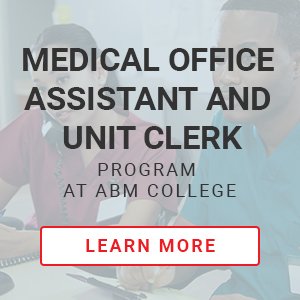Although Medical Office Assistants (MOAs) and Administrative Assistants seem like similar job titles, the training required for both job positions helps differentiate the two from one another. On one hand, both professions provide general support to keep an organization running at full capacity, while on the other hand, these professions are different enough to be effective in their own respective fields.
This article will help you learn about the differences between the two professions, and what it means to be an administrative assistant and an MOA, as we delve into the following topics:
- Job Similarities: What do these roles have in common?
- What does an administrative assistant do?
- Mandatory Education: What does a medical office assistant do?
- MOA: What is the need for this education?
Job Similarities: What Do These Roles Have In Common?
MOAs and administrative assistants manage administrative tasks for an organization which include handling paperwork, answering phones, distributing mail, completing forms and managing the storage or filing system, to name a few.
Both roles may need a one year post-secondary education, according to ALIS. The average annual income for MOAs and administrative assistants in Alberta are $46,210 and 46,279, respectively.
What Does An Administrative Assistant Do?
Administrative assistants are trained to use spreadsheets and other word processing software to create reports, invoices, letters and several other documents. They handle basic bookkeeping responsibilities, manage projects, events, industry databases, greet and attend clients, answer phone calls, schedule and book appointments, while also completing a variety of other tasks on a daily basis.
It may seem as if this job description is identical to the one for MOAs, but the differentiating factor between the two positions is that MOAs are trained, specifically, to work in medical facilities, while administrative assistants are trained to work in any general office-based setting.
Mandatory Education: What Does A Medical Office Assistant Do?
Prior to completing the MOA diploma program, students are introduced and familiarized with medical terminology, body systems and diseases. In addition to this, a basic overview of physiology, anatomy and pharmacology is also given.
With this education, MOAs are qualified to work in any of the following medical facilities:
- Medical, Dental, Chiropractic and Physician offices
- Home Health Care Agencies
- Long Term Care Clinics
- Outpatient Clinics
- Nursing Homes
- Health Care Agencies
- Public Health Clinics
- Medical Supply Companies
By the end of their program, MOAs will be equipped to handle the primary duties of their profession like using different health softwares and other applications to book appointments, prepare reports, financial statements, medical records and more. They will be able to interview patients and complete intake forms, submit billing claims, process payments, keep medical facilities tidy, stocked and more.
MOA: What Is The Need For This Education?
The reason why MOAs require all of this education prior to beginning work is because most of their clients are patients of the facility they work in. Often, the attainment of basic medical knowledge and terminology prior to employment is mandatory in an attempt to make the patients feel more comfortable. The office assistants are able to answer medical questions and concerns that patients might have, while also being able to check their height, weight and blood pressure during every visit.
General administrative assistant training would not be sufficient for MOA occupations, as the patients, general environment and clients of MOA facilities are specifically oriented towards healthcare.
Aside from this, in order to be considered an eligible candidate for a MOA position, certification is required. For administrative assistant job postings, certification is preferable, however, it is not mandatory.
There are various responsibilities to being an administrative assistant that make the job worthwhile, and the same goes to becoming an efficient MOA. Regardless of which career you choose, the valuable service provided by both professions allow for a better client or patient experience, and a smoother flow of operations by the organizations that employ these professionals.

About The Author

Private Career College
ABM College is a leader in career-focused education, committed to empowering students with industry-relevant skills. With expert instructors and practical training, ABM College delivers high-quality programs in health, business, technology, and more, ensuring graduates are prepared to meet workforce demands. Known for its supportive learning environment and a focus on real-world application, ABM College is a trusted educational partner helping students achieve professional success across Canada.
